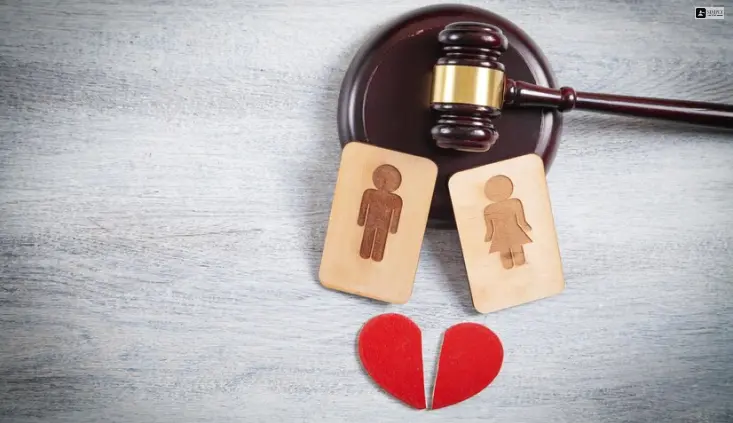
Cheating or cheating is a contentious issue that has impact several divorce settlement outcomes. Even though in US, the divorce laws vary by jurisdiction, the question that arrives and leaves us into thought: does cheating affect divorce settlements? This is a common question that arises in several legal negotiations.
The Us divorce rate has substantially declined over a significant period of time. In 2021, statistics show that despite their past role in cheating, 64% men and 52% women get married after their divorce.
Cheating comes with a severe emotional toll. You can actually sense that when a trial proceeding takes place. The feelings of betrayal, anger and desire for retribution impacts the mental health of the couples which cannot or shouldn’t be ignored.
This blog series will explore the different aspects of cheating and how it affects a divorce settlement. We will also discuss its legal implications and how it emotionally affects us.
Understanding the Role of Cheating in Divorce

The role of cheating in divorce varies on account of the state laws and its jurisdiction. In fault-based states like Arkansas, Delaware and New York, cheating is a grave crime and falls under the grounds to file for divorce. The innocent spouse can petition for dissolution of marriage if they encounter any behavior of adultery.
In a fault-based divorce state, cheating has severe legal implications for divorce settlements. The innocent spouse gains a larger share of marital assets. They also get favorable alimony that is arranged based on the gravity of their fault.
Cheating severely affects when it comes to getting a child custody. Cheating has a detrimental effect on the child’s well-being, and the court might not allow you custody if you’re found guilty of cheating.
Conversely, in states like Texas where there’s no provision for faults, divorce is primarily determined through a feasible settlement term that are favorable for both parties. The courts in these states focus on equitable asset distribution. They prioritize the interests of the child. However, the evidence of cheating might still remain relevant. In aspects of determining a behavioral pattern or a detrimental to the family unit.
Nevertheless, with the divorce system in place, cheating carries a significant amount of emotional weight among both the involved parties. There is a strong feeling of anger, betrayal and sadness in this case. These emotions often complicate the overall divorce settlement. It makes it difficult to make decisions on important issues of property division, alimony or child custody.
The role of cheating in the US comes with different legal and emotional factors. These implications are however based on the jurisdiction. However, it is often found that in some states the role of cheating is profound and shapes the overall course of divorce proceedings.
Legal Framework: Cheating and Divorce Laws of USA

The legal framework of divorce is vast and consists of a plethora of aspects. They are categorized into 3 different aspects that sum up the overall attribute of divorce laws in the USA. They are:
Fault vs. No-Fault Divorce
- In some states, cheating can be grounds for fault-based divorce, allowing the innocent spouse to petition for dissolution of the marriage.
- No-fault divorce states prioritize equitable distribution of assets and arrangements focused on children’s best interests, regardless of the reasons for divorce.
- In fault-based states, cheating can influence settlement terms, potentially leading to a larger share of assets or favorable alimony arrangements for the innocent spouse.
- In no-fault states, relevancy of cheating lies in child custody determinations. This dwells primarily on the wellbeing of the child.
Legal Definitions
- Adultery is one spouse engaging in a sexual relationship outside of marriage without the consent of the other spouse.
- Courts consider evidence of cheating, such as text messages, emails, or witness testimony, when determining fault or assessing its impact on settlements.
State Variations
- Divorce laws and procedures vary by state, with some states strictly adhering to fault-based grounds while others exclusively use no-fault principles.
- Understanding the specific laws and procedures in your state is crucial for navigating divorce proceedings involving cheating.
Impact on Alimony: Spousal Support and Cheating

Alimony is the fiscal support provided by one spouse to another during and after divorce proceedings. Alimony ensures both spouses to maintain the same standard of living during the marriage. However, when cheating is a major factor in divorce, it can cause a substantial impact on determining alimony.
Adultery
In several legal jurisdictions, cheating determines whether the spouse should provide alimony to the other. The court even determines the duration of payments as well. In fault-based states, courts even view cheating as a breach of marital trust. The innocent spouse in these states can even argue for a higher form of compensation as the emotional toll that the other spouse put on them because of the affair.
Alimony Determinations
Cheating is a major instrument that determines alimony in different cases. Courts even consider cheating as a relevant factor to determine separation along with the financial needs of the other spouse. For example, if the cheating spouse has depleted all the marital assets to support the innocent spouse if they are unable to work. The court in this case awards higher alimony payments.
Equitable Distribution of Marital Assets
Cheating can also impact alimony awards through its effect on the equitable distribution of marital assets. Imagine that the cheating spouses have vanished, taking away all the marital assets in their affair. Or suppose, they engaged in any kind of financial misconduct like hiding assets or spending the marital funds. In that case, the innocent spouse even gains the most share of the marital estate.
No-fault Divorce States and Alimony
In no-fault divorce states, reasons for the divorce generally don’t concern determining alimony; cheating may have less direct impact on spousal support awards. However, courts may still feel the financial consequences of cheating, such as dissipation of assets or reduced earning capacity, when determining alimony payments.
Mitigating Factors
Remember, cheating is just one of the factors where courts consider awarding alimony. Courts also consider issues like marriage length, spouses financial needs and lastly their overall contribution to the marriage and their earning capability. Moreover, some jurisdictions even have laws that limit alimony unless it’s all about adultery.
Negotiating Alimony Settlements
As a divorcing couple, you can also negotiate your alimony outside court via mediation. However, cheating still remains a relevant factor where the spouse would seek for higher alimony in exchange of agreeing to this settlement.
Division of Assets: Equitable Distribution and Adultery

The division assets primarily come in cases that involve adultery. Depending upon your state’s juridical, this will vary. However, in most cases, the marital assets are equally divided among both the parties. However, in case of cheating, this might daunt the overall procedure pf asset division.
Marital vs. Separate Property
In equitable distribution states, marital assets are generally those acquired during the marriage, while separate assets are those acquired before the marriage or through inheritance or gifts to one spouse. Adultery does not typically affect the classification of assets as marital or separate. However, if marital funds support the affair; or if the cheating spouse dissipated marital assets during the affair, this could impact the division of assets.
Impact of Adultery on Equitable Distribution

Adultery is a relevant factor in equitable distribution. Imagine that if the cheating spouse spent money on significant marital funds on their affair. Or maybe the cheating spouse has engaged in some form of financial misconduct. This in turn affects the overall division of assets. The innocent spouse in return gets a larger share of the marital estate to offset any losses that came with their spouse’s cheating.
Burden of Proof
When it comes to equitable distribution of assets, the burden of proof of cheating primarily lies on the innocent spouse. The innocent spouse has to demonstrate that the cheating by the other spouse has made a significant impact on their marriage.
Judicial Discretion
Ultimately, the division of assets in cases involving adultery is subject to the discretion of the court. Judges will consider various factors, including the duration of the marriage, each spouse’s financial contributions, their respective earning capacities, and any misconduct or fault on the part of either spouse. While adultery may be considered a relevant factor, it is just one of many factors that the court will weigh in determining a fair division of assets.
Settlement Negotiations
In some cases, divorcing spouses may negotiate a settlement outside of court through mediation or direct negotiations. Adultery can still be a factor in these negotiations, as the innocent spouse may seek a larger share of assets or other concessions in exchange for agreeing to a settlement.
Coping with the Effects of Cheating in Divorce

Coping with the effects of cheating during divorce can be emotionally challenging, but there are strategies to help navigate this difficult time:
Allow Yourself to Grieve: It’s important to acknowledge and process your emotions, whether anger, sadness, or betrayal. Permit yourself to grieve the loss of the relationship and the broken trust.
Seek Support: Ask friends, family members, or a therapist for emotional support. Talking about your feelings with trusted individuals can provide validation and comfort during this challenging time.
Focus on Self-Care: Prioritize self-care activities that promote physical, emotional, and mental well-being. This could include exercise, meditation, journaling, or engaging in hobbies and interests that bring you joy.
Set Boundaries: Establish clear boundaries with your ex-spouse to protect yourself emotionally. This may involve limiting communication or contact with them, especially if it’s causing additional distress.
Consider Therapy: Individual or group therapy can be beneficial for processing feelings of betrayal and rebuilding self-esteem. A therapist can provide tools and techniques for coping with the emotional fallout of cheating.
Practice Forgiveness (if Ready): Forgiveness is a personal journey and may not happen overnight. However, letting go of resentment and anger towards your ex-spouse can help you find peace and move forward.
Focus on the Future: While it’s natural to dwell on the past, shift your focus towards the future and the possibilities. Set new goals for yourself and take steps towards creating a fulfilling life post-divorce.
Wrapping Up…
The impact of cheating on divorce settlements is undeniably significant, albeit complex. While marital cheating evokes strong emotions and fuels contentious legal battles. It has a direct influence on the outcome of divorce settlements. It varies depending on jurisdiction, specific circumstances, and the court’s approach.
In some cases, evidence of adultery may serve as grounds for fault-based divorce, potentially influencing asset division. Other factors include alimony and child custody arrangements. However, many jurisdictions have shifted towards no-fault divorce laws, weighing less on financial settlements. Instead, courts focus on equitable distribution, considering factors such as the length of the marriage, the contributions of each spouse, and their respective financial needs.
Read Also:


